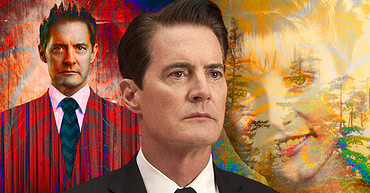
With a show like The X-Files, there are ups and downs. Any show that runs as long as The X-Files is bound to have some bad episodes. But, with a great show, even bad episodes prove to do things well and be a greater part of the show as a whole. This episode, “Ghost in the Machine,” was more of a miss than a hit, for sure, but there are several things that make it a relevant episode to the series as a whole.
On this episode of The X-Files: Mulder and Scully are brought on to a murder case by Mulder’s old partner, Jerry Lamana, who is in over his head a bit. The victim is a corporate executive, who seems to have been murdered by the company’s central computer system. Mulder’s informant, “Deep Throat,” returns.
There was a lot about this episode that I didn’t like, but I will get that out of the way first. I’m assuming that after the show’s first season, there was better notoriety so they could hire better guest actors. There have been a few that have been really great. But this episode’s guest acting (by and large) was terrible. It was over the top, choppy, and totally detracted from the story. Mainly, of course, I mean Rob LaBelle’s awful Brad Wilczek. He was extremely distracting. There was still some decent guest acting to see, with Jerry Hardin’s “Deep Throat” making an appearance. I’m also a pretty big fan of Wayne Duvall (Jerry Lamana), who recently guest starred on Gotham. What bothers me is not the two great guest actors, but the others who should’ve been performing at their level. Perhaps they weren’t given great material to work with (I didn’t care for the writing in this one, either), but Mulder and Scully always manage to blow me away.
I also didn’t care for the “artificial intelligence” story, either. Everything the computer did felt a little hokey. I was reminded of the fake film mentioned in Forgetting Sarah Marshall, about “what would you do if your mobile phone killed you?” Of course, there is a certain level of admiration that this episode deserves. For one, the computer being the villain foreshadowed a host of other stories to come later, like I, Robot or Avengers: Age of Ultron. Technology that can operate totally independently of human beings can be dangerous. This wasn’t a particularly strong episode of The X-Files, but it’s amazing to see even how the poor episodes have shifted the storytelling paradigm.
My favorite element was the continual shade thrown at the government. The main traits of the depicted government were secrecy and a desire to control a computer program that was quickly out of control, and had a presence everywhere. When the government agent fought Mulder for control of the computer, I couldn’t help but draw comparisons to our modern day NSA. Now, I can’t tell if Alex Gansa and Howard Gordon (the writers) were especially suspicious of the government in this way, but the writing seems to suggest they were, or were at least influenced by some things the government has done. Not only did this episode pave the way for other great films and television episodes, but it also predicted the future in a way. I know that Chris Carter was largely influenced by All the President’s Men, and government secrecy isn’t exactly a new concept, but there is no way that the creative forces behind this show are people who trust their government.
That, in a nutshell, is what I love about The X-Files. These episodes aired in 1993, and yet they hold up so well. They’re still culturally relevant today. The cinematic quality is excellent. The two leads are phenomenal, and the show (while still experiencing growing pains at this time) had clear stories that it wanted to tell. Stories like this would not still be getting told if they weren’t important, and The X-Files pioneered this type of storytelling. So, even when I watch a pretty bad episode (and this one definitely qualifies), it’s comforting to know how important it is to our culture, and how well the show has held up after more than twenty years.
What do you guys think? Let us know in the comments!
[Photo via FOX]
 Follow Us
Follow Us





